- Regulamin
- Koszty dostawy
- Kontakt
- Dziś w ofercie 233 586 produktów
KSIĄŻKI
- Albumy
- Beletrystyka
- Biografie
- Dla dzieci i młodzieży
- Edukacja
- Ekonomia i biznes
- Ezoteryka
- Historia
- Informatyka
- Kalendarze
- Komiksy
- Kryminał i sensacja
- Kultura i sztuka
- Literatura faktu
- Literatura kobieca
- Literatura piękna
- Medycyna
- Nauka języków obcych
- Nauki humanistyczne
- Nauki przyrodnicze
- Nauki ścisłe
- Podręczniki
- Poradniki
- Prawo i administracja
- Przewodniki i podróże
- Psychologia
- Religia
- Sport
- Technika
- Zdrowie i uroda
ZABAWKI
- Artykuły dla niemowląt
- Bączki
- Bujaki i skoczki
- Ciągnij / pchaj
- Dla niemowlaka
- Grzechotki i gryzaki
- Karuzele i pozytywki
- Maty i centra zabaw
- Projektory i lampki
- Sortery i piramidki
- Zabawki
- Edukacyjne i kreatywne
- Figurki
- Klocki
- Lalki
- Pojazdy
- Pluszaki i maskotki
- Sport i rekreacja
- Zabawa w dom
- Zabawki drewniane
- Puzzle
- Do 200 elementów
- 201-500 elementów
- 501-1000 elementów
- Ponad 1000 elementów
- Puzzle 3D
ART. PAP
- Artykuły biurowe
- Artykuły piśmiennicze
- Bloczki i kartki samoprzylepne
- Dziurkacze
- Kalkulatory
- Nożyczki i nożyki
- Skoroszyty
- Teczki
- Wizytowniki
- Zszywacze
- Artykuły szkolne
- Akcesoria szkolne
- Modelowanie
- Notatniki i zeszyty
- Piórniki
- Plecaki i torby
- Pojemniki na śniadanie
- Pomoce naukowe
- Przybory matematyczne
- Przybory rysunkowe
- Upominki i gadżety
- Akcesoria do książek
- Artykuły balowe
- Breloki i zawieszki
- Drobiazgi, różności
- Kubki
- Oferta Świąteczna
- Papeteria, kartki i naklejki
- Skarpetki Many Mornings
- Upominki
GRY
MULTIMEDIA
- Audiobooki
- Beletrystyka
- Biografie i wspomnienia
- Dla dzieci i młodzieży
- Fantastyka
- Filozofia i religia
- Historia
- Literatura faktu i reportaż
- Poradniki
- Sensacja i kryminał
- Filmy DVD/BD
- Animowane
- Biograficzne
- Fantasy
- Horrory
- Komedie
- Romanse
- Science Fiction
- Sensacyjne / kino akcji
- Thrillery
- Muzyka CD
- Alternatywna
- Blues
- Dla dzieci
- Jazz
- Klasyczna
- Piosenka aktorska i poetycka
- Pop
- Rock
- Świąteczna i kolędy
- Akcesoria GSM
- Głośniki
- Kable i adaptery
- Klawiatury
- Myszy
- Słuchawki
PROMOCJE
ZDROWIE
LEGO

Bartok: Violin concertos
Wydawca:
Brilliant Classics
EAN:
5029365943628
oprawa:
Plastikowa
czas trwania:
56:58
format:
14.0x12.0cm
język:
angielski
rok wydania:
2013
(0) Sprawdź recenzje
Opis produktu
Zasady bezpieczeństwa
The composition dates of the two violin concertos by Hungarian composer, pianist and ethnomusicologist Béla Bartók are separated by thirty years and provide a snapshot of his creative process at vastly different points in his life.
The first concerto (1907--8) had a rare emotional relevance: it was dedicated to the violinist Stefi Geyer, the object of Bartók's affections, and showcases different aspects of her personality. This two-movement work is reminiscent of the works of Strauss and Liszt. The lamenting theme of the first movement represents Bartók's unrequited love for Stefi, whose theme is repeated with tonal variation. This is followed by a lively second movement, with brilliant sections of arpeggios and scales, as well as whimsical leaps.
The second concerto (1937) is from a time in the composer's life when folk music had become a firm characteristic of his works, and explores more adventurous harmonies than the first. One of the great Classical and Romantic works, the neo-Classical concerto also contains elements of Baroque and Renaissance music, giving it an historical dimension. Highlights are the beautiful canon of the second-movement theme and the reappearance in the third movement of the theme from the first, this time in a rousing triple-time dance.
Internationally acclaimed violinist Thomas Zehetmair has enjoyed a remarkable career, performing and recording all over the world. He has also become equally sought-after as a conductor and is currently Musical Director of the Northern Sinfonia (UK).
Other information:
- Recorded in July 1995 at the Italian Institute, Budapest.
- Bartók's two violin concertos span an entire lifetime: the first one a work from his youth, with late romantic roots (Liszt, Richard Strauss) and the mature second concerto, a 20th century masterpiece in the genre, showing all facets of the genius of Bartok, his advanced and highly personal harmonics, the complicated rhythms and the never-far-away influence of the folklore music of his country Hungary.
- Thomas Zehetmair, one of the most imaginative and sincere violinists of his generation is seconded by the Budapest Festival Orchestra conducted by Iván Fischer, nowadays considered to be one of the best orchestras in the world, second to none in this repertoire.
- Contains liner notes on the pieces.
CENA:
21,19
zł
Cena detaliczna:
24,99 zł
15%
rabatu
Najniższa cena z ostatnich 30 dni: 21,19 zł
Produkt niedostępny
Uwaga!!!
Ten produkt jest zapowiedzią. Realizacja Twojego zamówienia ulegnie przez to wydłużeniu do czasu premiery tej pozycji. Czy chcesz dodać ten produkt do koszyka?


Wybierz wariant produktu
